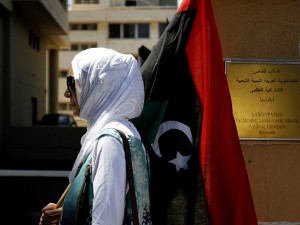Filipinos coming home from Libya happy and sad

A Libyan woman holds a Libyan rebel flag outside the Libyan embassy in Nicosia, Cyprus, Wednesday. AP
TRIPOLI, Libya—A handful of Filipinos were the first to board the first International Organization for Migration (IOM) boat to evacuate foreign workers from war-torn Tripoli on Thursday (3 a.m. Friday in Manila).
Some were happy, some sad, but all were relieved.
Construction foreman Ramil Nyala, 45, complained that he was leaving Libya empty-handed, without the precious remittances that are key to the Philippine economy.
“I was being paid $600 to $800 dollars a month. But they refused to pay me. I haven’t had work for four months, and I have to pay $350 a month in rent, so my savings are all lost,” he said.
“All the stores closed a few days ago, and even if you have money, Libyans are the priority. We couldn’t sleep at night because of the shooting everywhere. I’m happy to go and join my family,” said Nyala.
Article continues after this advertisement“I’m happy to go home to the Philippines,” said 9-year-old Arjan, whose mother worked at Tripoli’s main hospital. “I was frightened by all the bang-bang.”
Article continues after this advertisementOnly 35 OFWs
The Department of Foreign Affairs (DFA), citing a report from the Philippine embassy in Tripoli, said only 35 overseas Filipino workers (OFWs) were able to board the IOM vessel.
The embassy had been able to arrange with the National Transitional Council (NTC) safe passage for 91 Filipino evacuees but “some OFWs from various workplaces could not be brought to the port because of heavy fighting in the streets of Tripoli,” DFA spokesperson Raul Hernandez told a press briefing yesterday.
He said a team from the embassy would try to fetch the rest of the group for a second boat trip being arranged by the IOM.
More than 1,700 Filipinos have opted to remain in Libya even as Filipino diplomats warned them that it was still too dangerous to venture out.
“Clashes are ongoing in Tripoli” and “from the embassy, machine gun fires and explosions can still be heard,” Hernandez said, quoting foreign undersecretary Rafael Seguis who is in Libya to help with the evacuation.
There were more than 26,000 OFWs in Libya when antigovernment protests erupted six months ago. Around 13,000 of this number have been repatriated, but Philippine officials could not account for the rest, other than the several thousand who had requested assistance to leave as violence escalated last week.
Onward to Egypt
The IOM boat left with between 200 and 250 passengers on board, said the IOM spokesperson in Geneva, Jemini Pandya.
Martin Jerrett, head of the IOM Benghazi office, said the IOM ship aimed to spread the message that foreigners could get out.
“This journey is to establish our presence, there will be bigger boats coming tomorrow and in two days time, each for 1,000 people,” he said.
The chartered Turkish river ferry, which had waited offshore for two nights for the security situation to improve as rebels battled Moammar Gadhafi loyalists around the capital, was taking Filipinos, Egyptians, Canadians, Algerians and Moroccans.
The vessel only has four cabins, so most people will make the journey sitting down, armed with the food packages they’ve been given.
The IOM said the vessel would arrive in the eastern city of Benghazi on Saturday and the migrants then transported to the Egyptian border at Salloum before being helped to return to their home countries.
Hernandez said a team from the embassy is already in Salloum to receive and assist the Filipino evacuees and arrange their repatriation to the Philippines.
He said the NTC had helped the Filipino evacuees secure exit passes as well as provided them with security escorts on their way to the Tripoli port.
The DFA expressed support for the NTC following the defection of the Libyan Embassy in the Philippines to rebels now in control of the North African country.
Hernandez said the IOM, the leading intergovernmental organization in the field of migration, was shouldering the costs of the OFW evacuees’ travel from Libya to Egypt. The Philippine government would take care of their plane fare from Cairo to Manila, he said.
Like the 10,000 Filipinos who earlier fled Libya, the latest batch of evacuees would each get P10,000 in cash and avail of livelihood loans from the Overseas Workers Welfare Administration.
‘We love Libya’
Some of the Filipinos were obviously returning home with reluctance.
Julie, whose husband worked as a “senior production coordinator,” said she was sad to leave after living in the country since 1982, almost half her life, because “we love Libya.”
“I love the life, the weather, the money,” she said. “The standard of living is better than in the Philippines. Here we have money, we don’t need to cook,” she said.
“Our children were born and studied here, they speak Arabic and they want to come back,” she said. AFP with reports from Jerry E. Esplanada and Nancy Carvajal